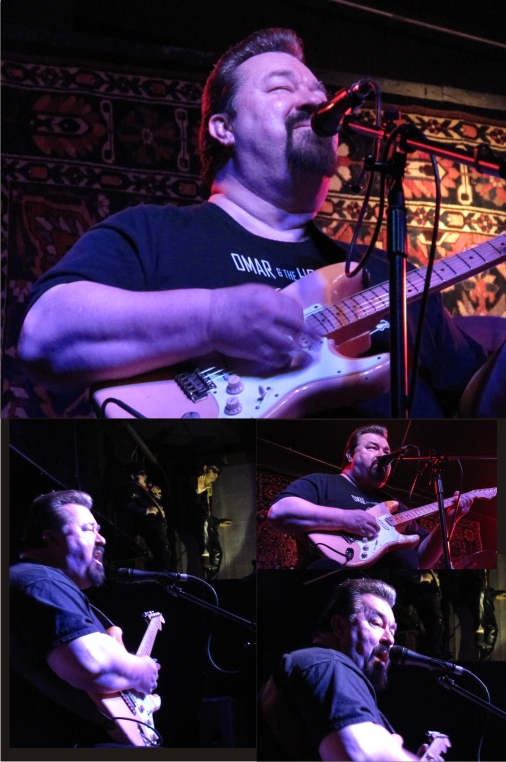
Austin, besides being the Texas state capital, is home to much of the best in American roots music. Since the 1970s, gutsy blues players, renegade country pickers, and raw-voiced rockers have mixed and matched their musical styles in Austin’s thriving club scene. And that’s where Kent “Omar” Dykes holds court, too.
He hails from McComb, MS, a town with the distinction of being home turf for Bo Diddley. Omar started playing guitar at twelve where he took to hanging out in edge-of-town juke joints playing with Wakefield Coney and other authentic blues greats in the middle of the night when his parents were asleep. He formed his first band at 13 – the next youngest player being 50 – and started honing his music. He was still Kent Dykes in those days, but by the time he hit 20 he had hooked up with a crazy party band, called the Howlers, based in Hattiesburg, MS. Looking back, he says, “We had two saxophone players on baritone and tenor who wore Henry Kissinger masks. They were called the Kissinger Brothers. Not on every song, mind you. Sometimes it was Dolly Parton playing saxophone. Or Cher. And we had these cardboard cutouts from record stores for skits.” They even did fake ads for Sunshine Collard Greens and Howlers’ Fried Chicken – “for that old-fashioned taste that tastes just like Grandma.”
It was a crazy time, but a lot of fun too, with the rough and tumble Howlers playing R&B, Rock ‘n Roll and even the occasional polka and western swing tunes. But Kent Dykes mostly just wanted to play blues. By then the other Howlers had taken to calling him “Omar Overtone” because he tended to let his guitar feedback on stage while he dropped to the floor to spin on his back in a spontaneous, Big & Tall Store take on break-dancing. As he says, those performances were “sometimes fueled by, a-hmm, too many adult treats.”
By 1976, the Howlers decided to move and relocate to Austin, where such clubs as the Soap Creek Saloon, the Broken Spoke, the Armadillo World Headquarters and Antone’s had created a haven for renegade music. “We worked out of Austin for about a year,” Omar says, “but a lot of the guys decided they weren’t cut out to play music full-time for the rest of their lives. They headed back to Mississippi and Arkansas, and I decided to keep the name. Nobody objected.” And as Dykes says, Omar & the Howlers works better than Kent & the Howlers. Of such decisions are careers made.
Fronting a new lineup, Dykes honed a band capable of the sort of raw, rowdy, rambunctious blues that made Howlin’ Wolf and Hound Dog Taylor legends. Omar's first release was Big Leg Beat in 1980, shortly followed by I Told You So 1984, earning Omar & the Howlers consecutive Austin band-of-the-year awards in 1985-1986. Hard Times in the Land of Plenty, recorded on Columbia Records, followed in 1987.
But really that was just the beginning as Omar followed up with another twelve albums in the next fourteen years; Wall Of Pride 1988, Monkey Land 1988, Live at the Paradiso, Courts Of Lulu, Blues Bag all in 1992. Blues Bag 1992 was Omar's first solo album followed by a second solo album, Muddy Springs Road in 1995. Omar also released World Wide Open in 1995. Next up was Southern Style 1996, Swingland 1998 followed with two releases; Live At The Opera House and The Screaming Cat both in 2000. But that's not all; Omar came on with Big Delta in 2001 and Boogie Man in 2003.
On Boogie Man, Omar brought in songwriter friends he’s made since he left Mississippi for Texas 27 years earlier. “Co-writing at that point in my life was a lot of fun. To me it’s like free songs. These are ones that I wouldn’t have had the patience to sit down and write on my own. But when you get with friends and drink coffee, tell jokes and stories, and then write something, it always turns out to be something different than what you might have done on your own.”
Plus it’s not exactly heavy lifting to work with such Texas icons as Ray Wyle Hubbard, Darden Smith, Alejandro Escovedo and Stephen Bruton.
Besides the songwriting collaborators, Omar also brought some friends into the recording studio, including guitarists Chris Duarte and Jon Dee Graham (True Believers), Chris Layton and Tommy Shannon of Stevie Ray Vaughan’s Double Trouble, George Rains (Sir Douglas Quintet and house drummer on scores of Antone’s label releases) and his frequent running-mates Terry Bozzio (Missing Persons, Jeff Beck, Frank Zappa) and Malcolm “Papa Mali” Welbourne
In 2006 Omar was back with more and did another four albums in the next four years; Bamboozled 2006, On The Jimmy Reed Highway (with Jimmie Vaughan) 2007 (with an episode on Austin City Limits - see Photos/Videos section), Chapel Hill (with Nalle, Omar and Magic Slim) 2008 and then in 2009 with Big Town Playboy.
2011 finds Omar tighter, funkier than ever. Essential Collection, a double cd compilation of Omar’s best songs throughout his career, was released in 2011 on Ruf Records. Big Guitar Music, Omar’s own record label, released I’m Gone and Too Much is Not Enough in 2012. Too Raw for Radio was released in 2013, followed by The Kitchen Sink in 2015 and Zoltar’s Walk in 2017, all on the Big Guitar Music label.
After struggling with health issues that caused an abrupt change in Omar’s touring career, he has published two books and is currently working on his third book that is scheduled to be released in the fall of 2021.